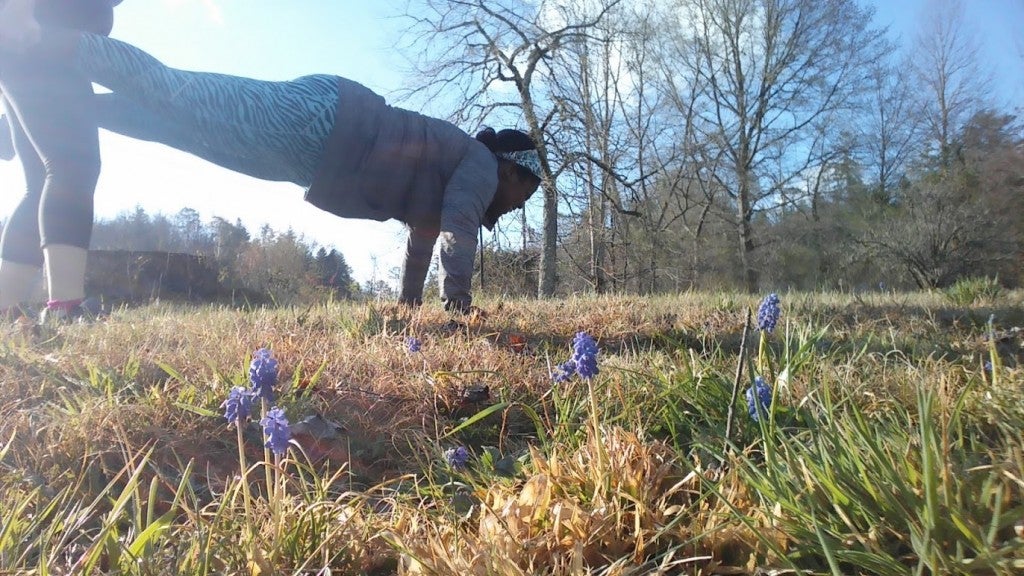Should You Train For An Obstacle Course Race?

What is OCR, anyway? Is it Occult Club Racing? Ornery Children’s Running?
OCR, an acronym that is still fairly new to me, stands for Obstacle Course Racing.
As some of you know, I’m training for my first OCR event— the Tough Mudder. So far, I’ve been having a blast preparing for it and I’m definitely noticing a huge difference in my overall strength.
I’m also finding it very necessary to become significantly stronger in my day to day running and training, so that I can avoid running-related overuse injuries. I decided to add some OCR events into my training to improve these three areas: total body strength, endurance and speed.
Total Body Strength and Balance
Climbing over things, hanging and swinging from ropes and bars, pulling myself up and across unwieldy and grip-less surfaces…all require significant overall body strength. I know for a fact that my upper-body and core strength will be tested the most on the various obstacles, so I’m paying extra special attention to these areas.
What I’m doing to prepare:
A million squats, a gazillion lunges, pushups, mountain-climbers, burpees, crab-walks, wheelbarrows, bear-crawls, hanging from a pull-up bar and doing knee raises, partner-carries (as in carrying another human on your back for a specified distance).
Does this help my running?
Yes. Leg strength and overall body strength are two incredibly important aspects of running. We run not only with our legs, but with our entire body. Our arms swing helps to propel us forward. Our core keeps us balanced and helps to avoid face-planting too many times (ok me—it keeps me from falling after tripping over one too many imaginary roots and snakes).
Related: 7 Ways To Sneak Strength Training Into Your Day
Endurance
Trail running is my bread and butter. Trail running for miles and miles miles is like pan-fried scallops in lemon butter sauce. Catch my drift? I LOVE trails, and I’d rather on them than anywhere else.
The event that I’m training for is between 10 and 12 trail miles and I’m super excited about that. But add 20 obstacles and it becomes exponentially more demanding. So my distance trail running had better be on point and not overly exhausting so that I have some left in the tank to at least try the obstacles.
What I’m doing to prepare
Trail running. And then more trail running on groomed trails, rocky and rooty trails, muddy trails, hilly trails, and flat trails—wait, do those even exist?
Does this help my running?
Yes. It’s running.
Speed
If you know me or if you’ve read any of the posts on my blog about speed training, you know that it’s not something I enjoy or care for. But I’m also pre-prepping for fall marathon training season (NYC, hopefully MCM too!) and I want to be a bit speedier than I currently am. So I’m biting the bullet and indulging.
What I’m doing to prepare
Speed intervals and repeats on the treadmill, out on my lawn and driveway. Over the next two weeks I’ll move to the track and the trail.
Does this help my running?
Absolutely. Most training plans have some sort of speed training in them. I firmly believe that training to be speedier on extra-tired legs and an even more exhausted upper-body and core has to have some benefits for “regular” running if done in a smart way and in moderation, of course.
Related: You Don’t Have To Be Fast To Do Speed Work
Mental Strength and Team Work
These are added benefits to events like the Tough Mudder, which is not technically a race (you can’t win, and most obstacles require team work.) I’d like to think that I can do everything on my own, but it’s nice to know that some things require you to ask for help and subsequently receive it. I think this is a life lesson, one that I have yet to learn. In terms of mental strength, or grit, or whatever you want to call it, we can ALL use a little more. As humans there are things we struggle with—at work, at home, those demons and naysayers— and persevering through the literal physical hurdles at an obstacle course race can teach us that we can indeed endure life’s challenges with individual preparation, teamwork and a sincere belief in our own abilities.
